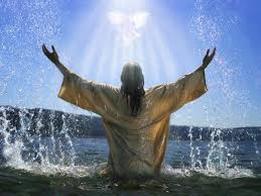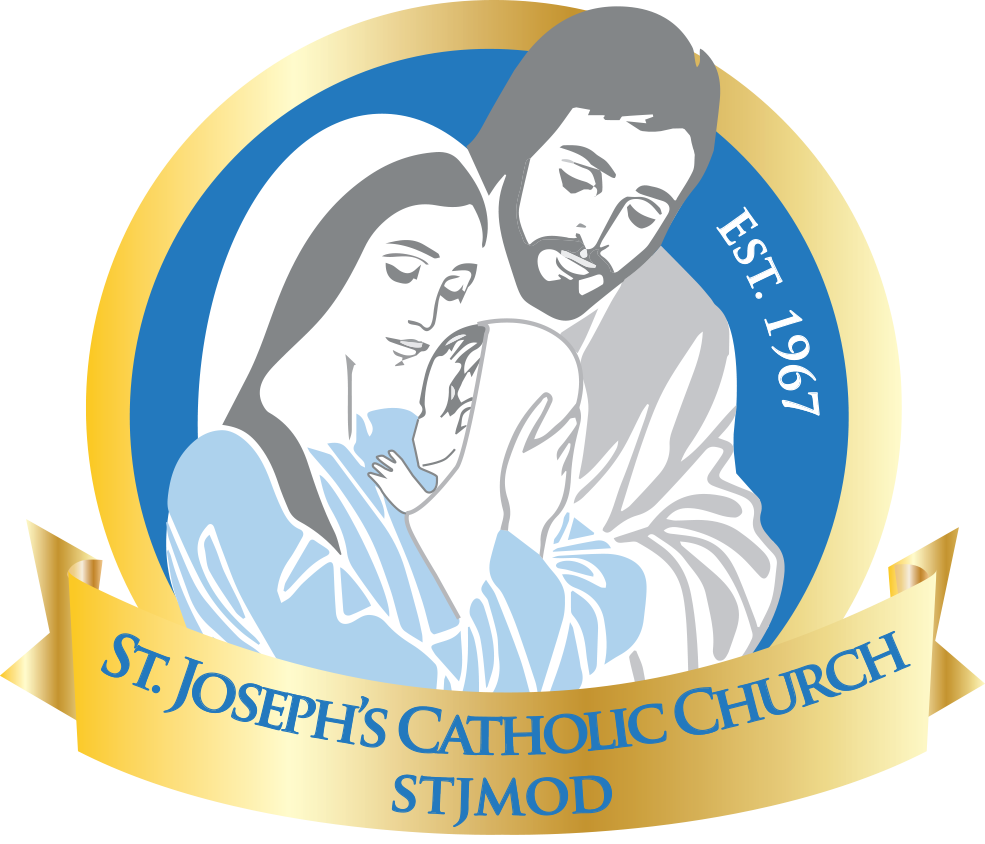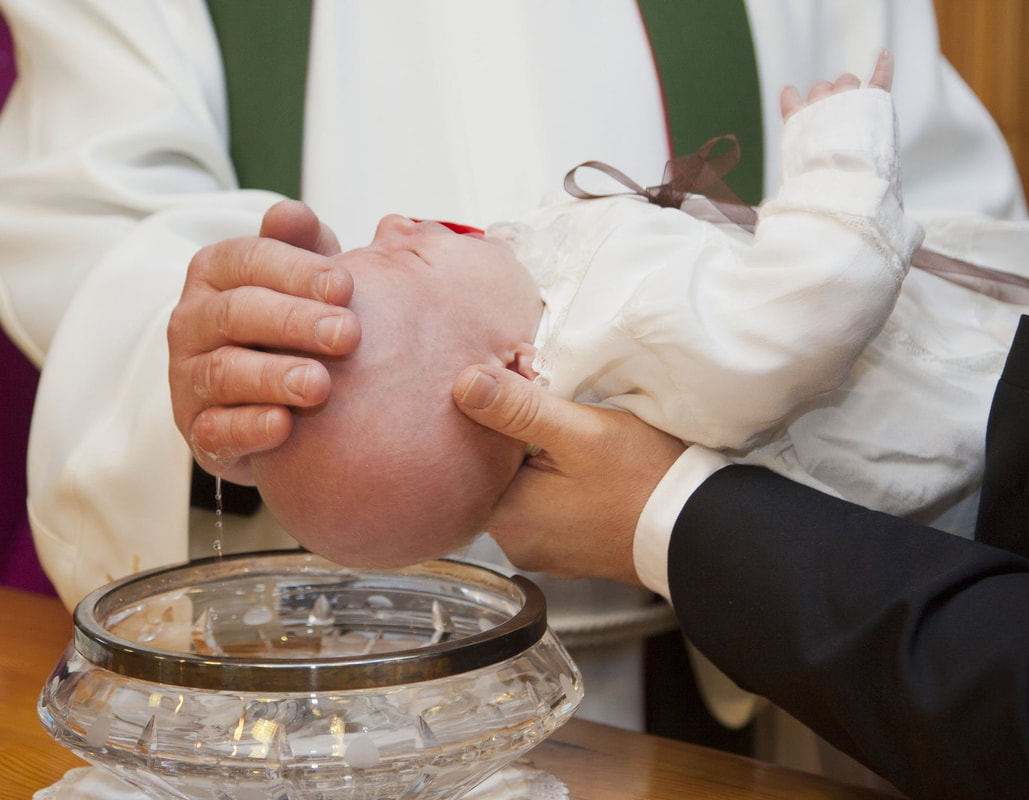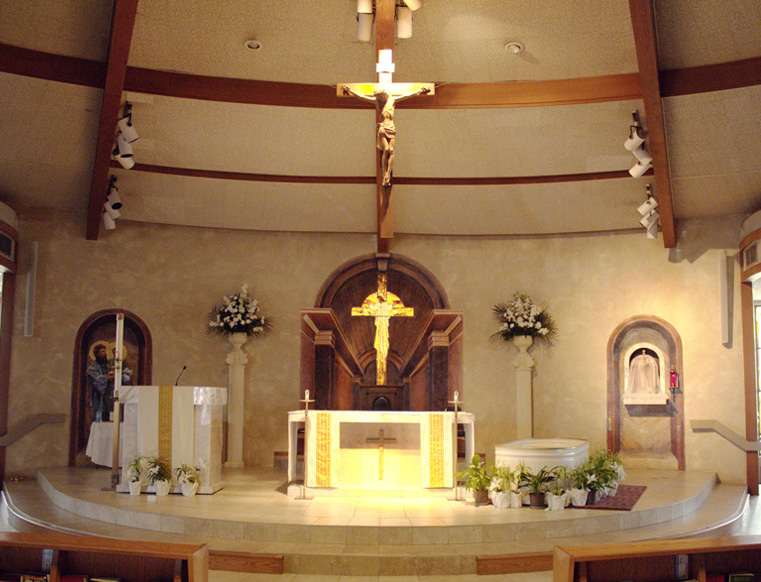Baptism

The parish family of St. Joseph's is happy you have chosen to have your child baptized. In the waters of baptism, we become members of the Body of Christ--God's People; we are configured to Jesus Christ the High Priest and share in his prophetic, kingly, and priestly mission; original sin is remitted. Baptism is the first of the three Sacraments of Initiation. The other two are Confirmation and Eucharist. This page will attempt to answer some of the questions you may have regarding infant baptism.
Preparation Class for Parents, Godparents, and Sponsors
Baptism FAQ
What do we need to do to have our baby baptized?
- Pick-up information packet: Registered parishioners may stop by the parish office to pick up the Baptism Application to be completed by the parents and the Sponsor/Godparent Forms to be signed and sealed in the sponsor's own parish.
- Pre-Baptism Class: Parents and Godparents must attend the Pre-Baptism class. (Classes may be taken at another parish - a certificate of completion is required.)
- Reserve a Date for the Baptism: As soon as your paperwork is completed take it to the parish office in order to reserve a baptismal date.
Sign up for Pre-Baptism Class Here
Why do the parents and Godparents have to attend a preparation class and Faith Formation?
Before the celebration of baptism, the Church expects parents and sponsors to be formed in the meaning of the Sacrament as well as its responsibilities (Canon 851). St. Joseph's offers preparation session on various weeknights and Saturday mornings. Pre-registration is necessary to attend.
The role of the sponsor (Godparent) is, “together who the parent and infant at baptism, and… help the baptized to lead a Christian life in harmony with baptism, and to fulfill faithfully the obligations connected with it” (Canon 872). One sponsor, male or female, is sufficient; but there may be two, one of each sex (Canon 873). Sponsors must: be sixteen (16) years of age, “be a Catholic who has been Confirmed and has already received the sacrament of the Holy Eucharist and leads a life in harmony with the faith and role to be undertaken" and “not be the father or mother of the child being baptized” (Canon 874). Sponsors must be Catholic: “a baptized person who belongs to a non-Catholic ecclesial community may not be admitted except as a witness to baptism and together with a Catholic sponsor” (Canon 874.2).
Families desiring to have a child baptized at St. Joseph's can pick up an information packet and Baptism Application from the parish office. These are to be completed by the parents and the Sponsor/Godparent Forms signed in the sponsor's own parish. As soon as the paperwork is completed take it to the parish office, a date may be reserved for the Baptism in the parish office.
The role of the sponsor (Godparent) is, “together who the parent and infant at baptism, and… help the baptized to lead a Christian life in harmony with baptism, and to fulfill faithfully the obligations connected with it” (Canon 872). One sponsor, male or female, is sufficient; but there may be two, one of each sex (Canon 873). Sponsors must: be sixteen (16) years of age, “be a Catholic who has been Confirmed and has already received the sacrament of the Holy Eucharist and leads a life in harmony with the faith and role to be undertaken" and “not be the father or mother of the child being baptized” (Canon 874). Sponsors must be Catholic: “a baptized person who belongs to a non-Catholic ecclesial community may not be admitted except as a witness to baptism and together with a Catholic sponsor” (Canon 874.2).
Families desiring to have a child baptized at St. Joseph's can pick up an information packet and Baptism Application from the parish office. These are to be completed by the parents and the Sponsor/Godparent Forms signed in the sponsor's own parish. As soon as the paperwork is completed take it to the parish office, a date may be reserved for the Baptism in the parish office.
Why does the Church baptize infants?
|
It has always been the practice of the Church to baptize infants. From the earliest days, when an adult was baptized so was everyone else in that person's household (see Acts 10). Along with the growth of Catholicism in the Fourth and Fifth centuries came a decrease in the number of adult baptisms and infancy became the primary time for baptism. After the Second Vatican Council the adult Catechumenate (or RCIA) was restored, but in keeping with the long-standing tradition of the Church, infant baptism is still normative.
|
But infants cannot make an act of faith in God or Jesus Christ, can they?
That is true, and the Church recognizes that, so infants are baptized on the faith of the parents. This means there must "be a founded hope that the infant will be brought up in the Catholic religion; if such a hope is altogether lacking, the baptism is to be put off" (Canon 868 1.1). In other words, if there is little or no faith on the part of the parents, little or no faith will be passed on to the child. In putting off the baptism, the Church is not refusing to baptize the infant; rather, the Church is ensuring that this child will be raised in the practice of the faith into which he or she has been baptized. Yes, postponing baptism may cause some anxiety or tension in the extended family, but it is also a time of reflection for the parents of the child on their own relationship with God, Jesus, and the Church. The Church earnestly desires all who are baptized to participate in the weekly liturgical and pastoral life of the community. This postponement should be viewed as a challenge to live out the baptism the parents themselves received earlier in life.
Who is considered for infant baptism?
The Church considers anyone who has not yet completed their seventh year to be an infant. Therefore, the parents of children under the age of seven may request baptism and attend the parish's infant baptism preparation session. For those children who are over seven years of age the Church requires that they make a profession of faith. Therefore it is necessary that they themselves be prepared for the Sacraments of Initiation. Please see the brochure on Children’s Initiation and contact the parish office for more information.
What is the role of the Sponsors/Godparents?
The role of the sponsor or Godparent is, "together with the parents, to present an infant at baptism, and help the baptized to lead a Christian life in harmony with baptism, and to fulfill faithfully the obligations connected with it." (Canon 872) In the beginning of the Rite of Baptism of Children, the Godparents are asked if they are willing to help the parents of the one baptized in their duties as Christian parents. Thus, the function of the Godparents is not merely ceremonial or social but to assist the parents in raising their child in the practice of the faith.
Who may serve as a Sponsor or Godparent?
|
The Church has established the following norms governing the qualifications needed to be a sponsor or Godparent. The sponsor must:
|
What does it mean to lead a "life in harmony with the faith and role to be undertaken?"
In addition to being a fully initiated Catholic (i.e., having received the Sacraments of Baptism, Confirmation, and Eucharist) the sponsor must also be person of faith--one who regularly attends Sunday Mass, has been married according to the norms of the Catholic Church (if married), and strives to deepen his or her relationship with God through Jesus. A good question to ask is: “Does this person take care of their own faith… if not is he/she likely to help take care of my child’s?”
May a non-Catholic be a Sponsor/Godparent?
Because the child is being baptized into the Roman Catholic Church, "a baptized person who belongs to a non-Catholic ecclesial community may not be admitted except as a witness to baptism and together with a Catholic sponsor." (Canon 874, 2). In other words, as long as there is one Catholic Godparent who meets all the requirements of the Church listed above, another baptized person, Catholic or non-Catholic, may be a witness to the baptism.
How many Godparents can a child have?
Only one Godfather and/or one Godmother can be baptismal sponsors (Canon 873) but additional Catholic persons may act as witnesses at the baptism.
Where and when is baptism celebrated?
|
Infant baptism is properly celebrated in the parish of the parents. If, for a just cause, another church is desirable, the permission of the home parish priest is needed. Sunday is the day the Church celebrates the resurrection of Jesus from the dead. Baptism, which is the dying and rising of the infant into the Pascal Mystery of Jesus, is most fittingly celebrated on this day, although baptism may be celebrated on other days of the week (Canon 856). As baptism signs forth the child's entrance into the Christian community, several children are normally baptized in one celebration.
Infant baptism in English is celebrated on most Saturdays at 10:00am and a few Sundays at 3:30pm; and in Spanish, every third Saturday at 10:00am. |
Does the child have to have a saint's name?
As a minimum, the Church requires that no name "foreign to a Christian mentality" be given to the child (Canon 855). Consider, however, choosing a name for the child from the rich tradition of models of the Christian life. In some cultures, the one is named after the saint whose feast day the child is born on or around. Then, as the child grows up, encourage him or her to learn about the patron, perhaps promoting a devotion to the child's namesake.
Is there a charge for the baptism?
The Church never charges for the celebration of a Sacrament. Rather, Christians give out of gratitude for what they have received from God. A donation to the parish may be made after the celebration of the baptism. As this donation does not go to the priest, a separate gift may be given to him.






